曼昆微观经济学原理第一章资料讲解
曼昆微观经济学第一章

第一章经济学十大原理本章重点人们如何做出决策1、人们面临权衡取舍存在效率(从稀缺资源中得到最多东西)和公平(在社会上公平地分配利益)之间的社会权衡取舍。
税收和福利这类政策使收入更为平等,但这种政策减少了辛勤的收益,从而使经济的产出降低。
2、某种东西的成本是为了得到它所放弃的东西一种东西的机会成本是为了得到这种东西所放弃的东西,这是某种东西的真实成本。
3、理性人考边际量理性人为了达到他们的目标会尽可能系统地做到最好。
边际变动是现行计划的增量变动,理性决策者只有在边际利益大于边际成本时才采取行动。
4、人们会对激励做出反应激励是一种引起人行动的东西。
由于理性人评价活动的边际成本与边际利益,因为,当这些成本或利益变动时,他们就作出反应。
公共政策可以改变活动的成本或利益。
人们如何相互交易5、贸易可以使没给人的状况都变得更好贸易可以使每个贸易者专门从事自己最擅长的事,并用自己的产出交换其他有效率生产者的产出,这对国家与个人都是正确的。
6、市场通常是组织经济活动的一种好方法利己者的竞争性活动所导致的价格是生产者和消费者成本与利益的信号,他们的活动不知不觉地使社会福利最大化。
中央计划者制定的价格不包含成本和利益的信息,因而这些价格不能有效地指引经济活动。
当政府用税收扭曲价格或者用价格控制限制价格变动时,价格也不能有效地指引经济活动。
7、政府有时可以改善市场结果政府首先必须保护产权,以便市场运行。
当市场不能有效地配置资源时,就存在市场失灵.在外部性或市场势力的情况下,政府可以干预并改善经济效率.政府还可以用所得税和福利为改善平等状况而进行干预。
整体经济如何运行8、一国的生活水平取决于它生产物品与劳务的能力收入和生活水平的差别主要是由生产率的差别引起的。
生产率是一个工人一小时所生产的物品与劳务量。
旨在提高生活水平的公共政策应该改善教育,生产更多更好的工具,并改进所获得的现有技术。
9、当政府发行了过多货币时,物价上升10、社会面临通货膨胀与失业之间的短期权衡取舍关键词稀缺性社会资源的有限性经济学研究社会如何管理自己的稀缺资源效率社会能从其稀缺资源中得到最大利益的特性平等经济成果在社会成员中平均分配的特性机会成本为了得到某种东西所必须放弃的东西理性人系统而有目的地尽最大努力去实现其目标边际变动对行动计划的微小增量调整激励引起一个人做出某种行为的某种东西市场经济当许多企业和家庭在物品与劳务市场上相互交易时,通过它们的分散决策配置资源的经济产权个人拥有并控制稀缺资源的能力市场失灵市场本身不能有效配置资源的情况外部性一个人的行为对旁观者福利的影响市场势力单个经济活动者(或一小群经济活动者)对市场价格有显著影响的能力生产率每一单位劳动投入所生产的物品与劳务数量通货膨胀经济中物价总水平的上升经济周期就业和生产等经济活动的波动简答为什么平等和效率之间存在权衡取舍?税收和福利可以使我们更平等,但削弱了辛勤工作的激励,减少了总产量。
曼昆《经济学原理(微观经济学分册)》第6版课后习题详解(1~2章)
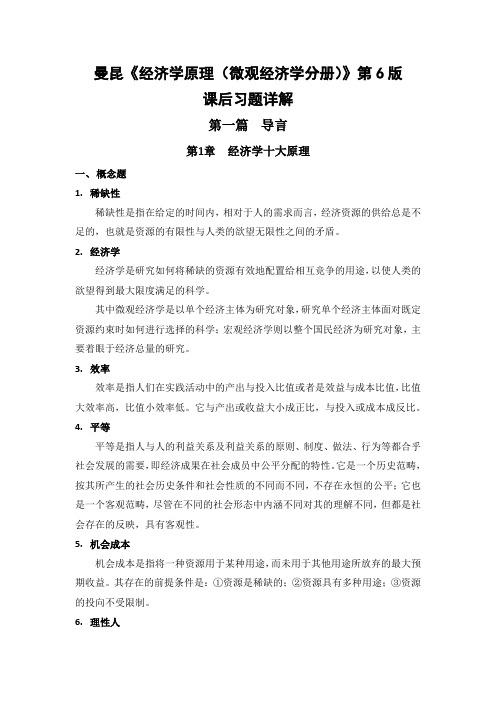
曼昆《经济学原理(微观经济学分册)》第6版课后习题详解第一篇导言第1章经济学十大原理一、概念题1.稀缺性稀缺性是指在给定的时间内,相对于人的需求而言,经济资源的供给总是不足的,也就是资源的有限性与人类的欲望无限性之间的矛盾。
2.经济学经济学是研究如何将稀缺的资源有效地配置给相互竞争的用途,以使人类的欲望得到最大限度满足的科学。
其中微观经济学是以单个经济主体为研究对象,研究单个经济主体面对既定资源约束时如何进行选择的科学;宏观经济学则以整个国民经济为研究对象,主要着眼于经济总量的研究。
3.效率效率是指人们在实践活动中的产出与投入比值或者是效益与成本比值,比值大效率高,比值小效率低。
它与产出或收益大小成正比,与投入或成本成反比。
4.平等平等是指人与人的利益关系及利益关系的原则、制度、做法、行为等都合乎社会发展的需要,即经济成果在社会成员中公平分配的特性。
它是一个历史范畴,按其所产生的社会历史条件和社会性质的不同而不同,不存在永恒的公平;它也是一个客观范畴,尽管在不同的社会形态中内涵不同对其的理解不同,但都是社会存在的反映,具有客观性。
5.机会成本机会成本是指将一种资源用于某种用途,而未用于其他用途所放弃的最大预期收益。
其存在的前提条件是:①资源是稀缺的;②资源具有多种用途;③资源的投向不受限制。
6.理性人理性人是指系统而有目的地尽最大努力去实现其目标的人,是经济研究中所假设的、在一定条件下具有典型理性行为的经济活动主体。
7.边际变动边际变动是指对行动计划的微小增量调整。
8.激励激励是指引起一个人做出某种行为的某种东西。
9.市场经济市场经济是指由家庭和企业在市场上的相互交易决定资源配置的经济,而资源配置实际上就是决定社会生产什么、生产多少、如何生产以及为谁生产的过程。
10.产权产权是指个人拥有并控制稀缺资源的能力,也可以理解为人们对其所交易东西的所有权,即人们在交易活动中使自己或他人在经济利益上受益或受损的权力。
《曼昆—微观经济学》重点总结材料(含重点图表)

《曼昆—微观经济学》重点总结第1篇导言经济学家研究:人们如何作出决策;人们如何相互交易;影响整体经济的力量和趋势。
效率是指经济蛋糕的大小,而平等如此是指如何分割这块蛋糕。
理性人通常通过比拟边际利益与边际本钱来做出决策。
当且仅当一种行为的边际利益>边际本钱时,一个理性决策者才会采取这种行动。
在经济学中,激励起着中心作用。
价格是“看不见的手〞用来指引经济活动的工具。
产权包括所有权,使用权,处置权,收益权。
市场失灵的原因:垄断;信息不对称;外部性;市场势力。
生产率取决于设备,劳动者的技能以与可用的技术。
·经济学十大原理人们如何做出决策1、人们面临权衡取舍2、某种东西的本钱是为了得到它所放弃的东西3、理性人考虑边际量4、人们会对激励做出反响人们如何相互交易5、贸易可以使每个人的状况都变得更好6、市场通常是组织经济活动的一种好方法7、政府有时可以改善市场结果整体经济如何运行8、一国的生活水平取决于它生产物品与劳务的能力9、当政府发行了过多货币时,物价上升10、社会面临通货膨胀与失业之间的短期权衡取舍第2章像经济学家一样思考·循环流向图:一个说明货币如何通过市场在家庭与企业之间流动的直观经济模型。
P26生产可能性边界:表示在可得到的生产要素与生产技术既定时,一个经济所能生产的产品数量的各种组合的图形。
P28生产可能性边界明确在某一特定时期内生产不同物品之间的权衡取舍,但随着时间的推移,这种权衡取舍可以改变。
·大多数经济学家一致同意的十个主X第3章相互依存性与贸易的好处当每个人专门生产自己有比拟优势的物品时,经济的总产量就增加了。
贸易可以使社会上每个人都获益,因为它使人们可以专门从事他们具有比拟优势的活动。
第2篇市场如何运行第4章供给与需求的市场力量完全竞争市场必须具备两个特征:1.可供销售的物品时完全一样的;2.买者和卖者人数众多,以至于没有任何一个买者或卖者可以影响市场价格。
曼昆《经济学原理(微观经济学分册)》知识结构导图考点难点归纳及课后习题详解考研真题详解(经济学十大原
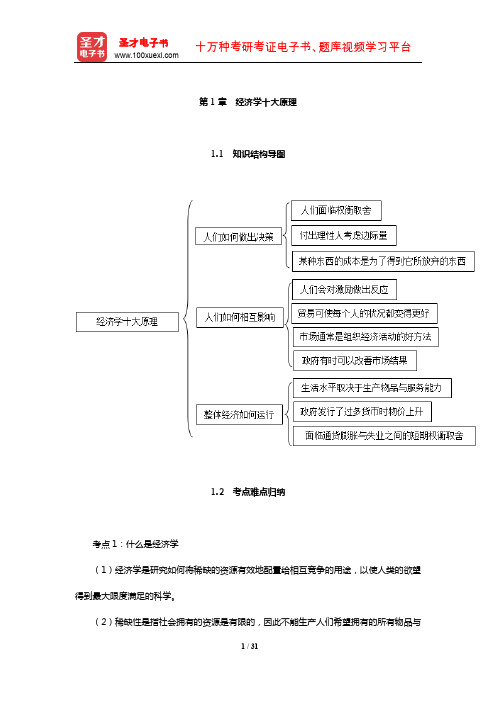
第1章经济学十大原理1.1 知识结构导图1.2 考点难点归纳考点1:什么是经济学(1)经济学是研究如何将稀缺的资源有效地配置给相互竞争的用途,以使人类的欲望得到最大限度满足的科学。
(2)稀缺性是指社会拥有的资源是有限的,因此不能生产人们希望拥有的所有物品与劳务。
现实中存在着资源的有限性和人类欲望的无限性之间的矛盾。
经济学家们从经济学角度来研究使用有限的资源来生产什么、如何生产和为谁生产的问题。
经济学研究的问题和经济物品均以稀缺性为前提。
【名师点读】经济学有两个最基本的假设:①经济个体是理性的,即理性人——系统而有目的地尽最大努力实现其目标的人;②经济资源是相对稀缺的,消费的前提是生产分配及交换,而生产的前提是有资源,资源的稀缺性决定了人必须进行选择。
深刻的理解理性人假设及资源的稀缺性是学好本门课程的关键。
考点2:经济学十大原理【名师点读】经济学的十大原理是对经济学研究的各领域的中心思想的概括,考生应理解并记住。
(1)经济个体在追求最大化目标时,其理性行为受到限制,因此经济学尤其是微观经济学十分强调约束条件下的最大化。
做出决策时,任何一种行为的成本可用其所放弃的机会衡量,理性人通过比较边际成本与边际收益作出决策,人们根据其所面临的激励改变行为。
(2)关于整体经济,考生需理解一些基本概念。
如生产率决定了不同国家和地区的生活水平,是生活水平差异的最终根源,货币量的增长是通货膨胀的最终根源,社会面临通货膨胀与失业的短期权衡取舍等。
具体内容在后续章节有具体讲到,考生需熟练掌握。
1.3 课后习题详解一、概念题1.稀缺性(scarcity)答:经济学研究的问题和经济物品都是以稀缺性为前提的。
稀缺性指在给定的时间内,相对于人的需求而言,经济资源的供给总是不足的,也就是资源的有用性与有限性。
人类消费各种物品的欲望是无限的,满足这种欲望的物品,有的可以不付出任何代价而随意取得,称之为自由物品,如阳光和空气;但绝大多数物品是不能自由取用的,因为世界上的资源(包括物质资源和人力资源)是有限的,这种有限的、为获取它必须付出某种代价的物品,称为“经济物品”。
曼昆经济学原理第一章(第七版)

即问即答
• 为什么一个国家如果不把自己和其他国家隔离开 来,其情况会变得更好?
• 1、国家和家庭一样,也可以从与其他国家的贸易中获得 收益。 • 2、贸易使得每个国家专业从事自己最擅长的产品的生产。 • 3、通过贸易,任何国家享受的商品和服务种类都大大增 加了。 • 4、在世界经济中,中国、日本、法国、埃及和巴西这样 的国家,既是美国的竞争对手又是美国的合作伙伴。经济 上不隔离,各国的情况都会变得更好。
1.2 人们相互影响
• 1.2.3 原理七:政府有时可以改善市 场结果
• ①为什么需要政府? • A、政府实施规则并维持对市场经济至关重要的制度,看 不见的手才能施展其魔力。 如产权,要通过要通过警察 和法庭来维护。 • B、看不见的手并不是无所不能的(市场失灵),有时必 须通过政府干预,才能促进效率或促进平等。
1.1 人们如何做出决策
• 1.1.3 原理三:理性人考虑边际量
• ④边际决策解释水与钻石的价格 E、事实上,现在我们对水的消费量往往都比较大(供给 几乎无限量),钻石的消费量却远没有那么大(供给非常有限 的)。我们可以天天喝水喝到吐,却不能天天买钻石。所 以,大量水的边际效用小于少量钻石的边际效用。 F、按照边际效用学派的解释,比较钻石和水的价值并 不是比较两者的总价值,而是比较每份单位的价值。尽管 水的总体价值对于人类来说再大也不为过,毕竟水是生存 必需品,但是,考虑到全球的水资源足够充沛,水的边际 效用也就处在相对较低水平。另一方面,急需用水的领域 一旦被满足,水就被用作不那么紧急的用途,边际效用因 此递减。
• 1.2.2 原理六:市场通常是组织经济活动 的一种好方法
• ①此处的“市场”是相对于“计划”而言的,对应的经济 制度分别为:市场经济制度、中央计划经济制度。 • ②在实行中央计划经济制度的国家: A、what/how/for whom均由政府决定; B、价格由政府决定 C、支撑理论:只有政府才能以促进整个社会经济福利 的方式组织经济活动。
曼昆经济学原理第6版微观PPT第一章
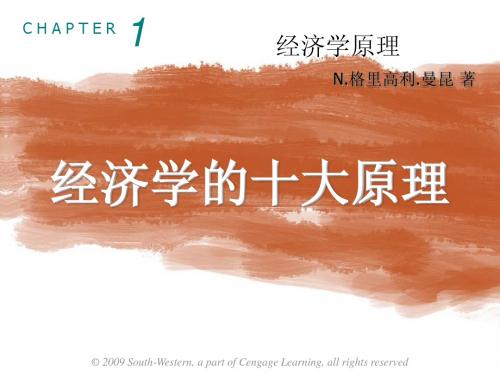
经济学十大原理
12
人们如何做出决策
原理二: 某种东西的成本是为了得到它所放弃 的东西
人们做出决策时需要比较可供选择行动方案的成
本与利益
任何一种东西的机会成本是为了得到这种东西所
放弃的东西
这是人们做决策的相关成本 谚语:舍不得孩子套不了狼;熊掌和鱼二者不可
兼得。
经济学十大原理
13
人们如何做出决策
你将从课堂上领会更多东西 2. 要总结,而不是划重点线 划重点线是一种消极的做法,它不能帮助你理解或 记忆。相反,用你自己的话总结每一节的内容,然 后与该章结尾的内容提要相比较
经济学十大原理
33
参考资料:如何阅读本书
3. 考考自己 在你开始阅读下一节之前,试着解决上节的“即问 即答”。并写下你的答案,与书后的答案进行核对。 如果你答错了,也许你就需要复习一下该节
经济学十大原理
24
人们如何相互交易
原理 7 :政府有时可以改善市场结果
政府的重要作用: 保护产权 (通过警察,法庭)
如果人们的财产存在很大的被侵犯的风险,那么他
们便不愿意工作,生产,投资或者购买物品
经济学十大原理
25
人们如何相互交易
原理 7 :政府有时可以改善市场结果
市场失灵:市场本身不能有效配置资源的情况 原因: 外部性:生产或消费一个物品影响到旁观者的福利
国家之间也能从贸易与专业化中受益 将他们生产的物品出口而得到一个更好的价格 从国外进口更便宜的物品而不用在国内自己生产
经济学十大原理
21
人们如何相互交易
原理 6 :市场通常是组织经济活动的一种好方法
市场: 大量的买者与卖者
(不必要在同一个地点)
曼昆微观经济学第1章经济学十大原理
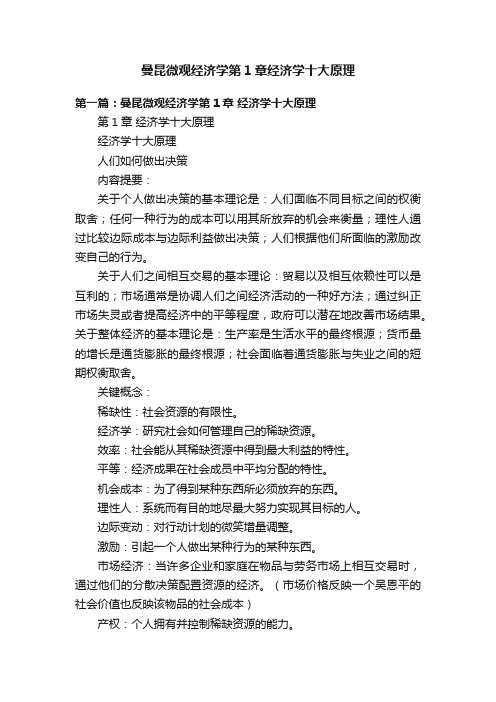
曼昆微观经济学第1章经济学十大原理第一篇:曼昆微观经济学第1章经济学十大原理第1章经济学十大原理经济学十大原理人们如何做出决策内容提要:关于个人做出决策的基本理论是:人们面临不同目标之间的权衡取舍;任何一种行为的成本可以用其所放弃的机会来衡量;理性人通过比较边际成本与边际利益做出决策;人们根据他们所面临的激励改变自己的行为。
关于人们之间相互交易的基本理论:贸易以及相互依赖性可以是互利的;市场通常是协调人们之间经济活动的一种好方法;通过纠正市场失灵或者提高经济中的平等程度,政府可以潜在地改善市场结果。
关于整体经济的基本理论是:生产率是生活水平的最终根源;货币量的增长是通货膨胀的最终根源;社会面临着通货膨胀与失业之间的短期权衡取舍。
关键概念:稀缺性:社会资源的有限性。
经济学:研究社会如何管理自己的稀缺资源。
效率:社会能从其稀缺资源中得到最大利益的特性。
平等:经济成果在社会成员中平均分配的特性。
机会成本:为了得到某种东西所必须放弃的东西。
理性人:系统而有目的地尽最大努力实现其目标的人。
边际变动:对行动计划的微笑增量调整。
激励:引起一个人做出某种行为的某种东西。
市场经济:当许多企业和家庭在物品与劳务市场上相互交易时,通过他们的分散决策配置资源的经济。
(市场价格反映一个吴恩平的社会价值也反映该物品的社会成本)产权:个人拥有并控制稀缺资源的能力。
市场失灵:市场本身不能有效配置资源的情况。
外部性:一个人的行为对旁观者福利的影响。
市场势力:单个经济活动者(或一小群经济活动者)对市场价格有显著影响的能力。
生产率:每一单位劳动投入所生产的物品与劳务数量。
通货膨胀:经济中物价总水平的上升。
经济周期:就业和生产等经济活动的波动。
1.人们面临权衡取舍2.某种东西的成本是为了得到它所放弃的东西3.理性人考虑边际量4.人们会对激励做出反应6.市场通常是组织经济活动的一种好方法7.政府有时可以改善市场结果9.当政府发行了过多货币时,物价上升 10.社会面临通货膨胀与失业之间的短期权衡取舍人们如何相互交易5。
曼昆《经济学原理(微观经济学分册)》(第7版)课后习题详解
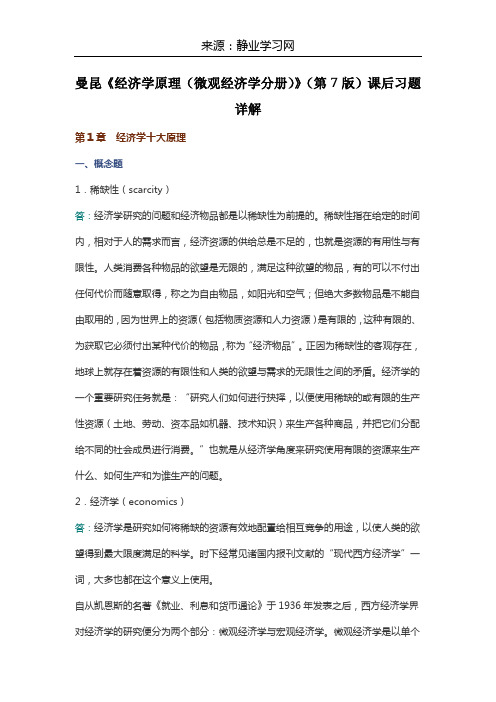
曼昆《经济学原理(微观经济学分册)》(第7版)课后习题详解第1章经济学十大原理一、概念题1.稀缺性(scarcity)答:经济学研究的问题和经济物品都是以稀缺性为前提的。
稀缺性指在给定的时间内,相对于人的需求而言,经济资源的供给总是不足的,也就是资源的有用性与有限性。
人类消费各种物品的欲望是无限的,满足这种欲望的物品,有的可以不付出任何代价而随意取得,称之为自由物品,如阳光和空气;但绝大多数物品是不能自由取用的,因为世界上的资源(包括物质资源和人力资源)是有限的,这种有限的、为获取它必须付出某种代价的物品,称为“经济物品”。
正因为稀缺性的客观存在,地球上就存在着资源的有限性和人类的欲望与需求的无限性之间的矛盾。
经济学的一个重要研究任务就是:“研究人们如何进行抉择,以便使用稀缺的或有限的生产性资源(土地、劳动、资本品如机器、技术知识)来生产各种商品,并把它们分配给不同的社会成员进行消费。
”也就是从经济学角度来研究使用有限的资源来生产什么、如何生产和为谁生产的问题。
2.经济学(economics)答:经济学是研究如何将稀缺的资源有效地配置给相互竞争的用途,以使人类的欲望得到最大限度满足的科学。
时下经常见诸国内报刊文献的“现代西方经济学”一词,大多也都在这个意义上使用。
自从凯恩斯的名著《就业、利息和货币通论》于1936年发表之后,西方经济学界对经济学的研究便分为两个部分:微观经济学与宏观经济学。
微观经济学是以单个经济主体(作为消费者的单个家庭或个人,作为生产者的单个厂商或企业,以及单个产品或生产要素市场)为研究对象,研究单个经济主体面对既定的资源约束时如何进行选择的科学。
宏观经济学则以整个国民经济为研究对象,主要着眼于对经济总量的研究。
3.效率(efficiency)答:效率指人们在实践活动中的产出与投入之比值,或者是效益与成本之比值,如果比值大,效率就高;反之,比值小,效率就低。
效率与产出或者收益的大小成正比,而与成本或投入成反比,也就是说,如果想提高效率,必须降低成本或投入,提高收益或产出。
- 1、下载文档前请自行甄别文档内容的完整性,平台不提供额外的编辑、内容补充、找答案等附加服务。
- 2、"仅部分预览"的文档,不可在线预览部分如存在完整性等问题,可反馈申请退款(可完整预览的文档不适用该条件!)。
- 3、如文档侵犯您的权益,请联系客服反馈,我们会尽快为您处理(人工客服工作时间:9:00-18:30)。
TEN PRINCIPLES OF ECONOMICS
4
HOW PEOPLE MAKE DECISIONS
Principle #2: The Cost of Something Is What You Give Up to Get It
▪ Making decisions requires comparing the costs
In this chapter, look for the answers to these questions:
▪ What kinds of questions does economics address? ▪ What are the principles of how people make
how much to work, save, and spend
▪ how firms decide how much to produce,
how many workers to hire
▪ how society decides how to divide its resources
between national defense, consumer goods, protecting the environment, and other needs
Principle #3: Rational People Think at the Margin
Examples:
▪ When a student considers whether to go to
college for an additional year, he compares the fees & foregone wages to the extra income he could earn with the extra year of education.
▪ make decisions by evaluating costs and benefits
of marginal changes – incremental adjustments to an existing plan.
TEN PRINCIPLES OF ECONOMICS
7
HOW PEOPLE MAKE DECISIONS
books, and fees, but also the foregone wages. …seeing a movie is not just the price of the ticket,
but the value of the time you spend in the theater.
TEN PRINCIPLES OF ECONOMICS
and benefits of alternative choices.
▪ The opportunity cost of any item is
whatever must be given up to obtain it.
▪ It is the relevant cost for decision making.
efficiency vs. equality
▪ Efficiency: when society gets the most from its
scarce resources
▪ Equality: when prosperity is distributed uniformly
among society’s members
6
HOW PEOPLE MAKE DECISIONS
Principle #3: Rational People Think at the Margin
Rational people
▪ systematically and purposefully do the best they
can to achieve their objectives.
▪ Tradeoff: To achieve greater equality,
could redistribute income from wealthy to poor. But this reduces incentive to work and produce, shrinks the size of the economic “pie.”
TEN PRINCIPLES OF ECONOMICS
5
HOW PEOPLE MAKE DECISIONS
Principle #2: The Cost of Something Is What You Give Up to Get It
Examples: The opportunity cost of… …going to college for a year is not just the tuition,
▪ When a manager considers whether to increase
decisions?
▪ What are the principles of how people interact? ▪ What are the principles of how the economy as a
whole works?
0
What Economics Is All About
TEN PRINCIPLES OF ECONOMICS
1
The principles of HOW PEOPLE MAKE DECISIONS
HOW PEOPLE MAKE DECISIONS
Principle #1: People Face Tradeoffs
▪ Society fcity: the limited nature of society’s
resources
▪ Economics: the study of how society manages
its scarce resources, e.g.
▪ how people decide what to buy,
